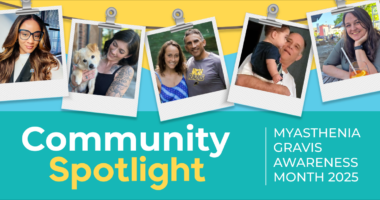When living with a rare disease threatens your financial stability
Even planning for future illness can go awry in today's healthcare system

June 25 marks four years since I was diagnosed with myasthenia gravis (MG). Looking back brings to mind the ancient Greek dramatist Aeschylus, who observed that “he who learns must suffer. And even in our sleep pain, which cannot forget, falls drop by drop upon the heart, until, in our own despair, against our will, comes wisdom through the awful grace of God.”
From 2020 to 2024, my emotional pain has been falling drop by drop. But that experience has also brought wisdom and a new perspective on life.
Throughout my career, I paid careful attention to my finances. When I was diagnosed, I was on track for a comfortable retirement. I’d read stories with headlines like “40% of Americans only one missed paycheck away from poverty” and thought I was prepared. That article, published by CBS News in 2019, noted that “millions of middle-class Americans are just one missed paycheck away from poverty, with 4 of 10 considered ‘liquid-asset poor,’ or without enough money socked away to cope with even a sudden disruption in income.”
In 2020, I thought the firewall I’d built for myself would keep me safe from those types of financial threats. But I’d soon learn that MG doesn’t recognize firewalls.
My firewall included an income-replacement insurance policy. I was a teacher, and during the hiring process, we had the option of selecting a policy that protected us against vagaries like illness. Cautious about my finances, I signed up for the “platinum plan,” which would replace 66.66% of my salary if I became too ill to work, after a 60-day waiting period. I thought that selecting this plan would insulate me from the financial hardships that illness might cause.
Losing and regaining stability
Then COVID-19 came along. In a strange way, for months this worked to my benefit. Classes moved online, and my commute vanished. It was even easy to take occasional naps and begin to acclimate myself to MG.
Eventually, though, our school district required us to resume in-person instruction. By that time, MG had greatly weakened my immune system, which was one of the main factors that prompted my neurologist to recommend that I not return to campus.
The possibility that compliance with the district’s mandate could lead to a serious or even fatal illness forced me to take a leave of absence. When that leave expired, I filed paperwork with my disability insurer to start the income-replacement process.
Each day, as the bills mounted, financial collapse loomed over me. When what I once considered a simple process continued to drag on, I hired an attorney to resolve the matter. After that, the monthly payments started and my stress level decreased.
Stress plays a significant role in MG flare-ups. Decreasing it was a significant step forward in my treatment and disease-management plan. Subsequently, I focused my attention on MG.
I joined a support group snd made connections with both the MG community and the broader rare disease community. I learned about self-care issues like nutrition and exercise. In taking proactive measures, my life regained some of the stability that MG had eliminated.
Fast forward to October 2023. That month, I received a letter from my disability insurance provider claiming that I was no longer disabled. Payments would cease in 30 days, the letter warned. That meant that I would again face a financial crisis, which in turn would elevate my stress level. So I hired a disability attorney.
Six months have passed without any income. Luckily, my family is there to support me. But what becomes of those who aren’t so lucky? It’s a national disgrace that our country has failed to create a social safety net strong enough to catch those who plummet toward financial distress, bankruptcy, or homelessness due to a rare disease. To me, it’s indicative of moral failure.
I think we have our collective heads in the sand about this. Until the sword falls on them, most people remain oblivious to this imminent threat. By the time they realize it exists, it’s too late.
Note: Myasthenia Gravis News is strictly a news and information website about the disease. It does not provide medical advice, diagnosis, or treatment. This content is not intended to be a substitute for professional medical advice, diagnosis, or treatment. Always seek the advice of your physician or other qualified health provider with any questions you may have regarding a medical condition. Never disregard professional medical advice or delay in seeking it because of something you have read on this website. The opinions expressed in this column are not those of Myasthenia Gravis News or its parent company, Bionews, and are intended to spark discussion about issues pertaining to myasthenia gravis.







Craig
The stress of dealing with disability insurance companies is intense even when you're covered. Every letter includes a threat that your coverage may be terminated if they don't receive everything they ask for in a timely manner, and you're at the mercy of the doctor's offices and hospitals to send the medical records the insurance company asked for, or to fill out a new set of forms. Sorry to hear they ended your coverage, that's rough. Best of luck to you finding a path that either lets you work from home or resume some coverage!
Barbara Sliner
Wow! I was not diagnosed with MG, but I was diagnosed with it's "sister" rare disease LEMS {Lambert Eaton Myasthenic Syndrome} on June 29/2020, a Monday, only 2 days and 4 hours after I found my husband dead on Saturday. When I called my workplace on Saturday, a hospital, as I worked as an advanced practice nurse: I called to use my bereavement benefits. Once I received my diagnosis, I then called to initiate my disability claim. I too had made the decision to opt for the premium plan. The stress of then filing for Social Security Disability Income(SSDI), was daunting. I was unable to find a lawyer willing to assist me as LEMS is so very rare. Ultimately, with support group connections, I received assistance from an organization called ALLSUP. Once approved for SSDI, I thought all was good until I received that same type of letter from the insurance company. The frustration and anger that you think you pay for insurance, to then be challenged at every turn. I soon found out that the 66.66% would be only the STARTING POINT, as the salary would be paid minus the amount paid by SSDI. The latest letter, wanted to know if I have begun collecting any pension salary...as once I do, my income will once again be paid minus the amount of pension paid. I am still trying to manage the disbelief in how trusting I was to ever think that I would get the 66.66% amount. Ultimately, once I reach full social security age the disability insurance will stop. Teaching others to plan for their future in an aggressive manner is so important. Best wishes to all!
Alliah Czarielle
I can definitely relate to this! As someone who lives in the Philippines, healthcare is practically nonexist. If we do manage to avail a healthcare plan, it's usually through an employer-provided private HMO. But for freelancers like myself who struggle in a typical work environment, this is something I must avail out of pocket. Normally, HMO premiums are a significant chunk of my monthly income, which only barely covers my family's regular expenses - housing, electricity, food, and schooling for my kid! It's a harsh reality that only adds to my existing depression and anxiety.
Raquel
I too was dealt as a bad hand initially with my long term disability insurance through work. I was denied.
In my initial claim for benefits, I was also recommended to use an attorney for social security disability insurance for which the decision is still at large. However, I did file for an appeal with the long term disability insurance provider. Eventually I was
written a letter that the appeal had been reversed and that I would get my full salary until 2033. Of course, if SSDI were to be approved before then, they would pay only the difference. I still am required to send them medical records as requested. I am hopeful to be financially stable until I reach retirement age to receive benefits. I did not know I would have to report any money from my pension or retirement 401k money if I deem it necessary to withdraw any amount. I am glad to have read it in previous comments that I need to be aware retirement money along with social security money would be included and the LTD would make up the difference too on what amount they would give me monthly.
It is a shame people with rare diseases have to weather the decision process of those who make decisions without the proper education or knowledge about our illness. A general practice nurse was the one who did a haphazardous job in the initial denial of my claim with my long term disability insurer. I tried to hire an attorney, but for private insurance, there are few. I took it upon myself to ask for a hard and electronic copy of my claim file from them. It was something I researched you do before consulting an attorney. Because I read and audit inpatient electronic medical records as my prior job, I took the file and compared it to the log and the decision letter to find out how the denial was based. I noticed the RN made generalizations on the reasonings and did not consider other reasons listed and these other factors were simply ignored. Even on the call logs there were conflicting notes on what my EMR stated. I made a summary of the differences that were in conflict. I won my appeal. It was very rewarding. I felt as if a miracle had taken place because on my initial claim, I received the denial the day my mother's funeral took place. A year later in February, I was in much distress I was considering going back to work or starting to take out money from my retirement benefits since I was due to return to work on 3/27/24. I then received my letter about the decision to reverse their decion according to my appeal in late February. This is why I felt a victory for my finances. I also learned my monies would not be taxed because my premiums were paid with after tax dollars. My employer would also be continuing my medical insurance until 2028. Thank God all the events eventually were in my favor. I do need to find insurance for myself starting in 2029 since I also have been getting at home infusions for IVIG at 4K per month and 2 weeks ago I started Rystiggo which I also know is expensive but a also qualified for a grant to pay it The patient Assistance Fund is who worked this out for me. The Kroeger Specialty Pharmacy did the work finding the source for me. You do have to advocate a lot for yourself. Just have patience.